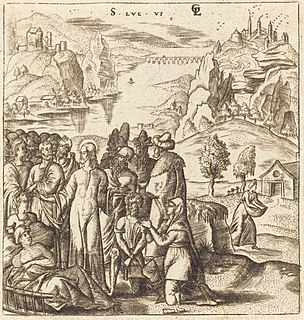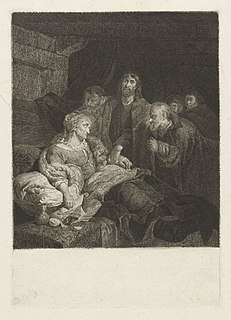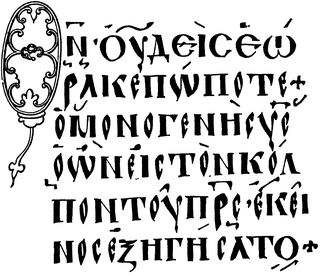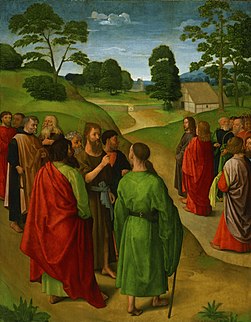Related Research Articles

Ecce homo are the Latin words used by Pontius Pilate in the Vulgate translation of the Gospel of John, when he presents a scourged Jesus Christ, bound and crowned with thorns, to a hostile crowd shortly before his Crucifixion. The original New Testament Greek: "ἰδοὺ ὁ ἄνθρωπος", romanized: "idoú ho ánthropos", is rendered by most English Bible translations, e.g. Douay-Rheims Bible and King James Version, as "behold the man". The scene has been widely depicted in Christian art.

Matthew 4:2 is the second verse of the fourth chapter of the Gospel of Matthew in the New Testament. This verse is just preceding the section in Matthew dealing with the temptation of Christ by Satan. Jesus has been led out into the wilderness and in this verse he fasts.
The Apostles Fast, also called the Fast of the Holy Apostles, the Fast of Peter and Paul, or sometimes St. Peter's Fast, is a fast observed by Eastern Orthodox, Oriental Orthodox, Eastern Catholic, and Reformed Orthodox Christians. In the Byzantine tradition, the Fast begins on the second Monday after Pentecost, whereas in the Coptic and old Syriac traditions, the Fast begins on the first Monday after Pentecost. It continues until the Feast of Saints Peter and Paul on June 29. Traditionally, its duration varies from eight to forty-two days because of the moveable nature of Pascha (Easter). However, in Eastern Orthodox Churches that follow the Revised Julian calendar, the fast can be as long as 29 days, or may not occur at all in some years.

Matthew 9:2 is the second verse in the ninth chapter of the Gospel of Matthew in the New Testament.
Matthew 9:4 is a verse in the ninth chapter of the Gospel of Matthew in the New Testament.

Matthew 9:9 is the ninth verse in the ninth chapter of the Gospel of Matthew in the New Testament.
Matthew 9:10 is a verse in the ninth chapter of the Gospel of Matthew in the New Testament.
Matthew 9:14 is a verse in the ninth chapter of the Gospel of Matthew in the New Testament.
Matthew 9:17 is a verse in the ninth chapter of the Gospel of Matthew in the New Testament.
Matthew 9:23 is a verse in the ninth chapter of the Gospel of Matthew in the New Testament.
Matthew 9:25 is a verse in the ninth chapter of the Gospel of Matthew in the New Testament.

Matthew 8:14 is the fourteenth verse of the eighth chapter of the Gospel of Matthew in the New Testament. This verse describes the start of Jesus healing Peter's mother-in-law.
Matthew 8:22 is the 22nd verse in the eighth chapter of the Gospel of Matthew in the New Testament of the Christian Bible.
Matthew 8:20 is the 20th verse in the eighth chapter of the Gospel of Matthew in the New Testament of the Christian Bible. It reveals the Homelessness of Jesus and his followers.
Matthew 8:27 is a verse in the eighth chapter of the Gospel of Matthew in the New Testament.

John 1:20 is the twentieth verse in the first chapter of the Gospel of John in the New Testament of the Christian Bible.

John 1:36 is the 36th verse in the first chapter of the Gospel of John in the New Testament of the Christian Bible.

John 1:37 is the 37th verse in the first chapter of the Gospel of John in the New Testament of the Christian Bible.

John 1:42 is the 42nd verse in the first chapter of the Gospel of John in the New Testament of the Christian Bible.

John 1:43 is the 43rd verse in the first chapter of the Gospel of John in the New Testament of the Christian Bible.
References
- ↑ John MacEvilly, An Exposition of the Gospel of St. John consisting of an analysis of each chapter and of a Commentary critical, exegetical, doctrinal and moral, Dublin Gill & Son 1879.
- ↑ Cornelius Cornelii a Lapide; Thomas Wimberly Mossman The great commentary of Cornelius à Lapide, London: J. Hodges, 1889-1896.
- 1 2 3 "Catena aurea: commentary on the four Gospels, collected out of the works of the Fathers: Volume 6, St. John. Oxford: Parker, 1874. Thomas Aquinas".
 This article incorporates text from this source, which is in the public domain.
This article incorporates text from this source, which is in the public domain.